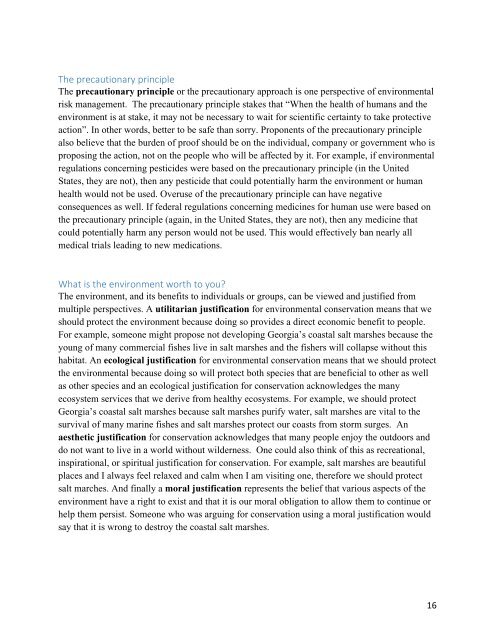Introduction to Environmental Science, 2nd Edition, 2018a
Introduction to Environmental Science, 2nd Edition, 2018a
Introduction to Environmental Science, 2nd Edition, 2018a
Create successful ePaper yourself
Turn your PDF publications into a flip-book with our unique Google optimized e-Paper software.
The precautionary principle or the precautionary approach is one perspective of environmental<br />
risk management. The precautionary principle stakes that “When the health of humans and the<br />
environment is at stake, it may not be necessary <strong>to</strong> wait for scientific certainty <strong>to</strong> take protective<br />
action”. In other words, better <strong>to</strong> be safe than sorry. Proponents of the precautionary principle<br />
also believe that the burden of proof should be on the individual, company or government who is<br />
proposing the action, not on the people who will be affected by it. For example, if environmental<br />
regulations concerning pesticides were based on the precautionary principle (in the United<br />
States, they are not), then any pesticide that could potentially harm the environment or human<br />
health would not be used. Overuse of the precautionary principle can have negative<br />
consequences as well. If federal regulations concerning medicines for human use were based on<br />
the precautionary principle (again, in the United States, they are not), then any medicine that<br />
could potentially harm any person would not be used. This would effectively ban nearly all<br />
medical trials leading <strong>to</strong> new medications.<br />
<br />
The environment, and its benefits <strong>to</strong> individuals or groups, can be viewed and justified from<br />
multiple perspectives. A utilitarian justification for environmental conservation means that we<br />
should protect the environment because doing so provides a direct economic benefit <strong>to</strong> people.<br />
For example, someone might propose not developing Georgia’s coastal salt marshes because the<br />
young of many commercial fishes live in salt marshes and the fishers will collapse without this<br />
habitat. An ecological justification for environmental conservation means that we should protect<br />
the environmental because doing so will protect both species that are beneficial <strong>to</strong> other as well<br />
as other species and an ecological justification for conservation acknowledges the many<br />
ecosystem services that we derive from healthy ecosystems. For example, we should protect<br />
Georgia’s coastal salt marshes because salt marshes purify water, salt marshes are vital <strong>to</strong> the<br />
survival of many marine fishes and salt marshes protect our coasts from s<strong>to</strong>rm surges. An<br />
aesthetic justification for conservation acknowledges that many people enjoy the outdoors and<br />
do not want <strong>to</strong> live in a world without wilderness. One could also think of this as recreational,<br />
inspirational, or spiritual justification for conservation. For example, salt marshes are beautiful<br />
places and I always feel relaxed and calm when I am visiting one, therefore we should protect<br />
salt marches. And finally a moral justification represents the belief that various aspects of the<br />
environment have a right <strong>to</strong> exist and that it is our moral obligation <strong>to</strong> allow them <strong>to</strong> continue or<br />
help them persist. Someone who was arguing for conservation using a moral justification would<br />
say that it is wrong <strong>to</strong> destroy the coastal salt marshes.


















